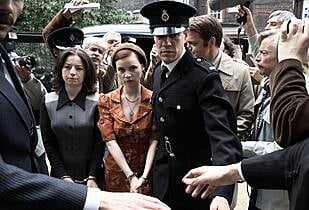- Culture
- 12 Mar 01

Media hysteria about illegal drugs may reach ever-greater levels of intensity, but are any of them as dangerous as ALCOHOL? STUART CLARK reports.
Is Alcohol a drug? In my case it is, yeah. I ve lost my wife, my kids and my business because of it. My doctor s told me that if I don t stop drinking, I ll be dead within two years. I can t stop, though. I ll be going along grand for a few weeks and then something goes haywire in my head and I m back on it. Everyone goes on about heroin being the scourge of Irish society, but far, far more people are fucked up on alcohol.
That s Michael, a 33-year-old West of Ireland man who was diagnosed last year as suffering from acute cirrhosis of the liver. He s been drinking, as he puts it, anti-socially since the mid-nineties when the death of his mother triggered a six month bender. His wife threatening to leave sobered him up for a while, but the respite was only temporary.
One moment I was sober and the next I was drinking two bottles of vodka every day, Michael resumes. My wife couldn t handle me in that state, and left taking my two daughters with her. The next thing to go was my electrical repair business which was in so much debt I had to do a runner. I still owe the VAT man #25,000, but my earning power at the moment is zero.
Michael s right when he says that drink is a far bigger problem in Ireland right now than illegal drugs. 565 people were admitted to psychiatric hospital for drug dependence in 1997 a fraction of the 5,435 who ended up there because of alcohol.
At least 25% of our population are drinking above safe levels and alcohol abuse is significantly implicated in crime, domestic disharmony, accidents, work absenteeism, unsafe sexual behaviour and health problems, says the Mid Western Health Board s Rolande Anderson.
Acknowledging that the only difference between them is their legal status, the MWHB has appointed a joint Drugs and Alcohol Officer who, while keen to address the area s growing heroin problem, says that this shouldn t be done at the expense of other addiction services.
With drink companies among their biggest advertisers, magazine and newspaper editors are sometimes slow to point out that for each one of Ireland s 8,000 drug addicts, there are at least 12 alcoholics.
Revealing last year that more than 50% of the cases he presides over are drink-related, the Mayo coroner, Dr Mick Loftus, described alcohol as, The real drug problem in Ireland. It s more potent than all the illicit drugs except morphine and heroin.
He accuses politicians of doing nothing about it , and cites the President s attendance at the Budweiser Derby as an example of the leaders of our country endorsing these companies and their products.
Loftus has an ally in Kevin Brain, a leading UK researcher who accuses the drinks industry of using drug-style imagery to target young drinkers.
Since the 1980s there s been a substantial shift in the style and pattern of drinking by teenagers resulting in heavier consumption and an increase in drinking to get drunk, he proffers. This change reflects a wider transformation of the alcohol market and the start of recreational drug wars in which alcohol is marketed as one of a range of psychoactive drugs.
Brain goes on to highlight four of the brewers and distillers tactical strikes:
The development of designer drinks such as ice lagers, alcopops, white ciders and buzz drinks;
the increase in strength of alcohol products in a direct attempt to compete in the psychoactive market;
sophisticated advertising campaigns to establish alcohol products as lifestyle indicators; and
the opening of new outlets aimed at the young such as cafi bars, theme pubs and club bars.
While nobody s suggesting that getting bladdered once in a while is going to kill you, the link between alcohol and serious disease has never been clearer.
In Ireland, mortality rates from alcohol-related cancers have been gradually increasing over the past 10 years, reveals a new European Commission report. The association of alcohol consumption with breast cancer, although not conclusive at this time, is a worrying development given that it is the leading cause of cancer among women in Ireland. In 1994, 29% of road deaths and 19% of all road injuries occurred between 9pm and 3am, the hours most associated with drinking.
There s also a fiscal dimension with alcohol-related illness, accidents and absenteeism costing the Exchequer an annual #325 million.
You think that you can give it up any time you want, and then you realise you can t, Michael resumes. People should realise that alcohol s a drug, the same as cocaine and heroin, and treat it with respect.










